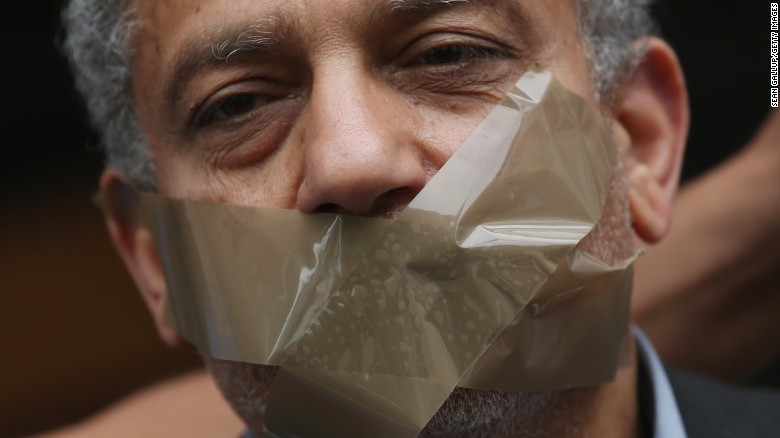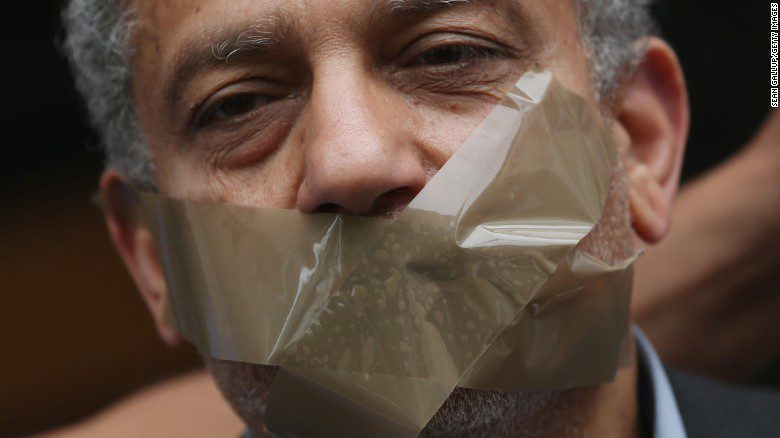
A new anti-terrorism law in Egypt will make publishing news that contradicts the official version of events in terrorism-related cases a crime punishable by prison sentences, a setback for the freedom of the press, according to the local journalists union.
The anti-terrorism draft law stipulates sentences for over a dozen accusations, including death sentences. It was approved by the Cabinet and the State Council and is pending the approval of President Abdel-Fattah el-Sisi, who has legislative powers in the absence of a parliament.
A terrorist attack on military outposts in Sinai led to an hourslong battle in a town near the Gaza border, killing at least 17 soldiers and over 200 militants on July 1, the military said. Some local and international media said military casualties were between 50 and 70.
Egyptian authorities criticized such reports. In a video released by the Ministry of Defense, Al-Jazeera network and Muslim Brotherhood affiliated TV channels were singled out for spreading false news and participating in anti-military propaganda.
The military removed the Brotherhood-affiliated president Mohamed Morsy from power in 2013 after mass protests. A deadly security crackdown and a wave of terrorism left hundreds of civilians, police and soldiers dead over the past two years.
‘Chained by the law’
Last Wednesday’s attack in Sinai was “unprecedented in the number of militants involved and the weapons used,” a high-ranking security official told CNN. Together with the assassination of the prosecutor general two days prior, it prompted calls for an anti-terrorism law in a bid to combat terrorism and bring justice.
“The hands of swift justice is chained by the law,” el-Sisi said on June 30, during the funeral of the Prosecutor General Hesham Barakat.
Barakat was killed in an explosion that targeted his convoy on June 29.
“Egypt is at the forefront of the fight against terrorism. We are cooperating with our international partners,” Foreign Minister Sameh Shoukry told journalists on Saturday.
The press briefing included “observations” on foreign media’s coverage of the latest terrorist attacks. Guidelines handed it out to journalists suggested the use of words such as “terrorists, rebels, slayers and eradicators” instead of “jihadists.”
El-Sisi’s call for expedited judicial procedure and implementations of verdicts was answered in the quick drafting of a number of laws, led by the anti-terrorism law.
The draft law, which got the approval of a number of political parties and regime allies, “transcends the main goal of the law of combating terrorism to appropriating freedom of the press,” the Journalists’ Syndicate said in a statement.
According to a draft of the law published by local media, the law stipulates no less than two years in prison for “publishing false news or statements about terrorist operations in contradiction to official statements.”
‘Dangerous and unconstitutional’
The Journalists’ Syndicate noted four other articles of the law that were also “dangerous and unconstitutional.”
“It appropriates the right of the journalist to acquire information from different sources and limits it to one side. This is a clear setback for the freedom of thought and press,” the syndicate was quoted as saying by the state-run daily Al-Ahram.
Eighteen journalists are in prison in Egypt, according to the Committee to Protect Journalists’ tally in June — the highest in Egypt’s history in CPJ records. “The threat of imprisonment in Egypt is part of an atmosphere in which authorities pressure media outlets to censor critical voices,” CPJ said.
“Authorities don’t want journalists to reach Egyptians, but want to control all information and be the only source of information,” Khaled El-Balshy, the head of the freedoms committee at the Journalists’ Syndicate, told CNN. The syndicate called for an emergency meeting on Monday to discuss the draft law in a bid to lobby for the removal or amendment of the controversial articles.
For rights groups, the government’s restrictive measures would be counterproductive.
“More attacks on civil and political rights and freedoms by security institutions won’t be a successful solution in the face of all these [terrorist] threats,” 14 Egyptian rights groups said in a joint statement last week.
Answering questions about that possible wide interpretations for terrorism and incitement in the draft law, the foreign minister said that “it will be up to the judge to determine what constitutes incitement.
FRENCH VERSION
La Loi antiterroriste projet stipule des peines pour sur unedouzaine accusations, y compris les condamnations à mort. Il a été approuvé par le Cabinet et le Conseil d’Etat et dans l’attentede l’approbation du Président Abdel-Fattah el-Sisi, qui a despouvoirs législatifs en l’absence d’un Parlement.
Les autorités égyptiennes ont critiqué ces rapports. Dans unevidéo diffusée par le ministère de la défense, les Al-Jazira et lesfrères musulmans des chaînes de télévision affiliées ont étéchoisis pour propagation de fausses nouvelles et participer à lapropagande anti-militaire.
Les militaires démis le Président de fraternité affiliés MohamedMorsy en 2013 après des protestations de masse. Une vague derépression sécurité mortelle et une vague de terrorisme a laissédes centaines de civils, de policiers et de soldats morts au coursdes deux dernières années.
« Enchaîné par la Loi »
« Les mains de la justice swift est enchaîné par la Loi, » el-Sisi a dit le 30 juin, lors des obsèques de la Procureur généraleHesham Barakat.
Barakat a été tué dans une explosion qui a visé son convoi le 29juin.
“L’Egypte est à l’avant-garde de la lutte contre le terrorisme.Nous coopérons avec nos partenaires internationaux,”ministredes affaires étrangères Sameh Shoukry a déclaré aux journalistesle samedi.
Le point de presse inclus « observations » sur la couverture parles médias étrangers des dernières attaques terroristes. Lignes directrices il remis aux journalistes a proposé l’utilisation de motstels que “terroristes, rebelles, slayers et éradicateurs” au lieu de“djihadistes”.
Appel de El-Sisi pour procédure judiciaire accélérée etimplémentations des verdicts a répondu par l’élaboration rapided’un certain nombre de lois, dirigée par la Loi de lutte contre le terrorisme.
Le projet de loi, qui a obtenu l’autorisation d’un certain nombrede partis politiques et les alliés du régime, « transcende leprincipal objectif de la Loi de lutte contre le terrorisme des’approprier la liberté de la presse, » syndicat des journalistes a déclaré dans un communiqué.
Selon un projet de loi publié par les médias locaux, la Loi prévoitau moins deux ans de prison pour “publication de faussesnouvelles ou des déclarations sur des opérations terroristes encontradiction avec les déclarations officielles”.
« Dangereux et inconstitutionnelle »
« Il s’approprie le droit du journaliste à acquérir des informationsprovenant de différentes sources et le limite à un côté. Il s’agitd’un clair recul pour la liberté de pensée et de la presse,”lesyndicat a été cité comme disant par le quotidien étatique Al-Ahram.
Dix-huit journalistes sont en prison en Egypte, selon le Comitépour le décompte de la protection des journalistes en juin—leplus élevé dans l’histoire de l’Égypte dans les documents CPJ. « La menace d’emprisonnement en Egypte fait partie d’uneatmosphère dans laquelle les autorités pression médias aux voixcritiques de censeur, » a déclaré le CPJ.
« Les autorités ne veulent pas journalistes pour atteindre lesEgyptiens, mais veulent contrôler toutes les informations et êtrela seule source d’information, » Khaled El-Balshy, le chef de laCommission des libertés au Syndicat des journalistes, a déclaré àCNN. Le syndicat réclame une réunion d’urgence lundi pourdiscuter du projet de loi dans le but de faire pression pour que lasuppression ou la modification des articles controversés.
Pour les groupes de défense des droits, des mesures restrictivesdu gouvernement serait contre-productif.
« Plus d’attaques sur les droits civils et politiques et des libertéspar les institutions de sécurité ne sera pas une solution efficaceface à toutes ces menaces [terroristes] », 14 groupes de droits del’égyptien a déclaré dans un communiqué commun la semainedernière.
Répondre aux questions sur les interprétations au sens large quepossible pour le terrorisme et l’incitation dans le projet de loi, leministre des affaires étrangères a déclaré que « il appartiendraau juge de déterminer ce qui constitue une incitation. »


